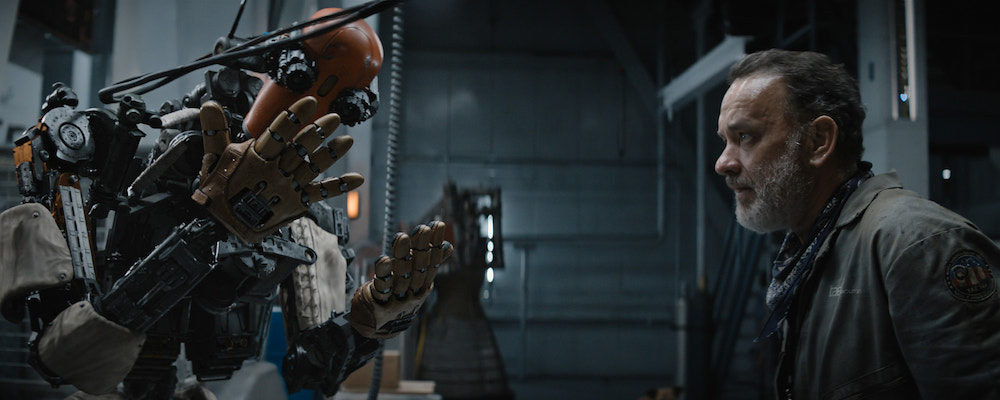‘Finch’: Tom Hanks, a Loyal Dog and Lovable Robot Ride Through a Dystopian Future
Alci Rengifo
It seems to be the end of the world, more than ever these days, in Movies and TV, and no other genre channels our modern anxieties like science fiction We await the final cataclysm caused by climate change the way previous generations feared nuclear war and even the threat of that menace hasn’t completely gone away, either. “Finch” references these fears with a dystopian fantasy that works as a wonderful allegory about growing up. Originally slated as a Universal release delayed by the pandemic, it’s one of the best original acquisitions Apple TV has released since the streamer’s debut, full of worry and heart. Few actors have captured these moods simultaneously like Tom Hanks. He is the guy you would want to guide you through the apocalypse. When he’s dead serious Hanks embodies our ideal of fatherhood on screen. The fact that he pulls it off so well with a robot further proves this. Yet this movie is so well-imagined the robot nearly upstages the Oscar winner.
As with many dystopian tales, “Finch” takes place at some point in the near future. A solar flare has rendered Earth a danger zone where constant UV radiation from above forces humans to live sheltered, only coming out at night. Finch (Hanks) is a former engineer living in a barren St. Louis, happy to keep away from any human contact. He spends his days building a droid and feeding data into its system from a vast, surviving library. He soon switches on his invention, a clunky yet agile robot with an orange, tube-like head. It seems to work but before the data download can complete, Finch, the new robot and Finch’s beloved pet dog Goodyear, have to flee when a massive storm that will last 40 days makes its way towards their base. Finch decides the best option for a new home is San Francisco, so they pack up into a battered, solar-powered RV and hit the road. Along the way Finch tries to instruct the robot, who names himself “Jeff,” in the ways of the world, because his purpose is to eventually watch over Goodyear, since Finch himself is terminally ill.
“Finch” is directed by Miguel Sapochnik, a veteran of TV who has worked on notable shows like “Game of Thrones” and miniseries like “Under the Dome.” It should be noted one of the producers is director Robert Zemeckis, who filmed Hanks in two of his most famous heart-tugs, “Forrest Gump” and “Cast Away.” This movie has the goofball charm of the former and wrenching battles against the odds of the latter. The only characters in this film are Finch, Goodyear and Jeff, plus a cute rover who adds to the mechanical moments of comic relief. It’s essential they all be likeable because Sapochnik convincingly stages an arid future where traces of life can be menacing. Finch doesn’t just avoid cities because he’s an introvert. Like the terrible future of “The Road,” bumping into fellow humans means coming across savage scavengers. What Sapochnik does differently is never show us the other survivors, only hints of them when Jeff stupidly wanders through an abandoned mall laden with traps, or when a mysterious car starts trailing the RV at night. Before this kind of film could have been seen as mere speculation, now in a pandemic world where people have fought over toilet paper, it’s not so implausible.
Like much recent sci-fi, the screenplay by Craig Luck and Ivor Powell is most definitely a commentary on the urgent theme of ecological catastrophe. War hasn’t ruined the world in “Finch,” but the loss of our ozone layer. It is rather chilling when Finch shows Jeff why he and Goodyear need protection, extending his hand into the sunlight and instantly blistering. Yet the environmental message is more eloquent and effective because the real focus of the film is how Finch, realizing he has little time left as he constantly coughs up blood, has to “raise” Jeff. Voiced by Caleb Landry Jones with a tone that slowly evolves from a Stephen Hawking drone to a smoother, post-adolescent identity, Jeff completely makes us forget he’s mostly CGI. With his narrow head with two eyes that seem like dots within sprockets and robotic, twiddling fingers, Jeff is a roaringly entertaining personality. He’s kindhearted but like everyone coming of age, makes many dumb mistakes, gets ahead of himself and gets scolded by Finch like a rowdy teenager. Sapochink expertly turns Goodyear into a character as well, capturing just the right tilts, expressions and yelps where we can almost guess what he would say if he became human.
“Finch” as a film is very human. It moves at an absorbing pace driven by Hanks’s performance, empathetic and sober, combined with Jones’s loveable Jeff. There are no big action scenes, although moments of genuine tension abound like a highway chase and a massive tornado speeding towards the RV. What makes this film special are the scenes where Finch and Jeff connect through genuine moments where the engineer remembers a world where the sun was taken for granted, or reflects on his sheltered existence and wasted time. He is from an era so recent that when he walks around abandoned buildings in a protective suit we hear him hum “American Pie.” Jeff the robot undergoes the cycles of life quickly and by the end learns what real sadness is and also real friendship. He is both a machine and member of a family, filled with dreams about one day reaching the Golden Gate bridge. Sapochnik announces himself as a director who can bridge good special effects that don’t overtake the narrative with a sincere, ultimately moving story. Jeff is one of the year’s most impressive digital creations, because we forget he’s not real and can relate to his trials and tribulations.
“Finch” begins streaming Nov. 5 on Apple TV+.

